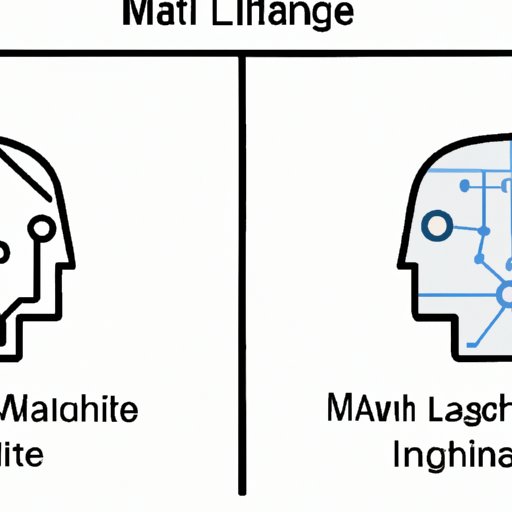Introduction
Machine learning and artificial intelligence (AI) are two of the most revolutionary technologies of the 21st century. While both have been rapidly gaining traction in the past few years, many people are still unsure about the exact differences between them and how they are related. This article aims to provide a comprehensive exploration of the differences between machine learning and AI, as well as their impact on businesses.

Comparative Analysis of Machine Learning and Artificial Intelligence
Before delving into the differences between machine learning and AI, it is important to first understand their definitions. Machine learning is a subset of AI that focuses on using algorithms to analyze data and learn from it. AI, on the other hand, is a broader concept that encompasses all forms of computer intelligence, including both machine learning and other automation techniques.
What is Machine Learning?
Machine learning is a form of artificial intelligence that uses algorithms to analyze data and make predictions based on the patterns it finds. By analyzing large amounts of data, machine learning algorithms can identify correlations and trends that would otherwise be impossible for humans to detect. Machine learning has become increasingly popular in recent years due to its ability to automate processes and make decisions quickly and accurately.
What is Artificial Intelligence?
Unlike machine learning, which is a subset of AI, artificial intelligence is a broad term that encompasses a wide range of technologies. AI can be defined as any technology that mimics human behavior or reasoning. AI includes a variety of applications such as natural language processing, image recognition, and robotics. AI also includes machine learning, but is a much broader concept that encompasses other automation techniques.

Examining their Similarities and Differences
Despite the differences between machine learning and AI, there are some similarities between the two. Both are used to automate processes and make decisions quickly and accurately. Additionally, both use algorithms to analyze data and make predictions. However, the main difference between machine learning and AI lies in their scope. While machine learning is focused on analyzing data and making predictions, AI is a broader concept that encompasses a variety of automation techniques.
Exploring the Relationship between Machine Learning and AI
While machine learning and AI are different, they are closely related. Machine learning is a subset of AI, so it relies heavily on the principles of AI. For example, AI algorithms are used to create and refine machine learning models. Additionally, AI is often used to improve the accuracy of machine learning models. Together, machine learning and AI can be used to automate processes and make decisions quickly and accurately.
How are Machine Learning and AI Different?
Although machine learning and AI share some similarities, they also have distinct advantages and limitations. Machine learning is primarily used to automate processes and make decisions quickly and accurately. AI, on the other hand, is more focused on understanding complex tasks and making decisions based on more than just data. AI also has the potential to solve problems that traditional algorithms cannot, such as those involving natural language processing and image recognition.

Examining the Impact of Machine Learning and AI on Businesses
The increasing popularity of machine learning and AI has had a significant impact on businesses. Companies can now use these technologies to automate processes and make decisions quickly and accurately. Additionally, machine learning and AI have the potential to improve customer experience by providing personalized recommendations and services. Finally, these technologies can be used to reduce costs and increase efficiency by automating tedious tasks.
Understanding the Benefits and Limitations of Machine Learning and AI
Although machine learning and AI can offer many benefits to businesses, they also have some limitations. For example, machine learning algorithms can be difficult to train and maintain, and AI algorithms require large amounts of data to be effective. Additionally, both types of algorithms can be prone to errors and bias if not properly monitored. Despite these challenges, machine learning and AI can still provide a lot of value to businesses if implemented correctly.
Conclusion
In conclusion, machine learning and AI are two distinct technologies with unique advantages and limitations. Although they are closely related, they have different scopes and applications. Machine learning is primarily focused on analyzing data and making predictions, while AI is more focused on understanding complex tasks and making decisions based on more than just data. Ultimately, both technologies have the potential to revolutionize businesses and help them reach new heights of success.
(Note: Is this article not meeting your expectations? Do you have knowledge or insights to share? Unlock new opportunities and expand your reach by joining our authors team. Click Registration to join us and share your expertise with our readers.)
